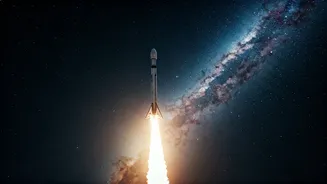Musk's Grand Claim
Elon Musk's SpaceX has set an audacious target: to handle 90% of the worldwide payload mass sent into space by 2025. This bold assertion underscores SpaceX's
rapid growth and innovation within the space industry. The company, known for its reusable rockets and ambitious projects, has steadily increased its market share, challenging traditional aerospace companies. Musk's statement reflects SpaceX's confidence in its technological advancements and operational efficiency. This declaration wasn't made in isolation, as the space race intensifies, with numerous nations and private firms vying for leadership. The implications are far-reaching. If achieved, it would revolutionize space access, potentially reducing costs and speeding up the pace of exploration. However, achieving 90% dominance in such a short timeframe presents numerous logistical and competitive hurdles. This forecast also places significant pressure on the rivals. The space industry is in a state of rapid change, and SpaceX is currently at the forefront.
Pichai's Perspective
Google's CEO, Sundar Pichai, responded to Elon Musk's claims, adding a layer of corporate interest to the discussion. While the specific nature of Pichai's response isn't detailed in the original source, his involvement suggests that Google acknowledges the significant impact SpaceX's ambitions could have on various sectors. Google has a strategic interest in space, particularly in satellite technology, data collection, and internet services. Google's response signals that other industry players are taking notice of SpaceX’s plans. The reaction also highlights the interconnectedness of the tech and space industries. Companies like Google recognize the potential benefits and challenges that SpaceX's dominance presents. This highlights the competitive dynamics at play and the increasing importance of space exploration for both established tech giants and emerging space firms. Both companies' actions showcase that the future will require cooperation.
Impact and Implications
If SpaceX realizes its goal of carrying 90% of the global payload mass by 2025, the effects will be substantial. The most immediate impact would be felt in the launch market. SpaceX would likely set pricing trends and service standards, thus controlling a large part of the market. This scenario could reshape how space missions are planned and executed, potentially leading to a drop in launch costs. Moreover, SpaceX's success could drive further innovation. This domination could also have implications for national space programs and international cooperation. While the prospect of a single company dominating such a significant portion of space activities raises questions about market competition and regulatory oversight, it could also foster rapid advancements in space technology. The potential for an accelerated rate of technological growth and space exploration is considerable, reshaping our understanding of the universe.




















